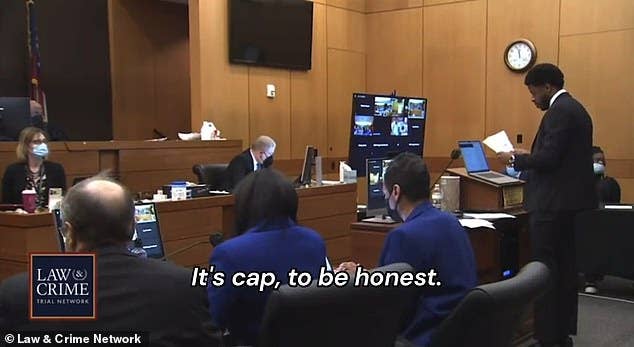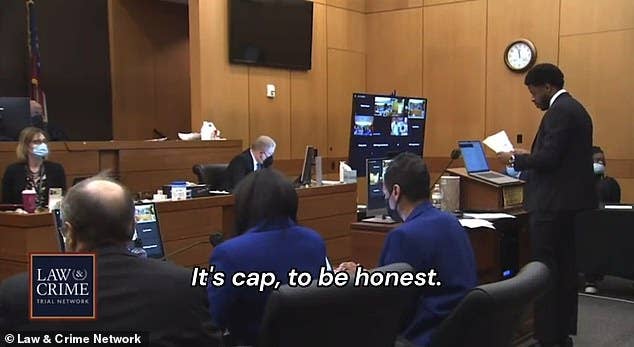
This has been a very active and hectic week for the YSL RICO trial—a federal racketeering case involving Young Thug and 14 other defendants. The case is only in its first phase of jury selection, and yet, has left much to be discussed due to several videos from court leaking online.
On Monday, Justin Hill, a defense attorney for defendant Damone Blalock, went viral for saying the colloquial term “cap” during a court proceeding when referring to a statement another attorney made that was untrue. When speaking with Hill over the phone, he tells Complex that it was a very brief moment in his 20-minute argument. But in hindsight, after reflecting on how much attention he received from that moment he says, “I don’t necessarily apologize for what I said. But if I had known that it was going to get this big, I probably wouldn’t have said it.”
In the few days since Hill’s viral moment, several other tumultuous moments have unfolded in court. On April 19, chaos erupted in the Fulton County courtroom. Video from the proceeding shows a loud commotion involving a defendant and a court officer. In the video, Young Thug is seen looking around confused as screams from a defendant can be heard from outside of the court room. On April 20, defense attorney Anastasios Manettas was arrested in court for allegedly bringing prescription medication into the courtroom. After security discovered the bottled medication, Manettas allegedly threw his phone at a deputy. He was subsequently arrested and charged with battery on a law enforcement officer, obstruction and disrupting court proceedings, and possession of pills not in their original container.
Despite videos that have leaked from the trial, Hill tells Complex that “there are a lot of misconceptions… The media can oftentimes take things and spin it the way that they want to get a good story,” he adds. “Being in the courtroom every single day with co-counsel and the other clients who are involved in the case, these guys aren’t bad people, these guys are people who are victims of the system.”
In addition to fighting for his clients in court, Hill is also an artist in his own right. In 2022, he recorded and released his first song, “When It Get Real” to promote his law firm. After getting positive feedback, he released several other songs as well as a five-track EP. Though he has had to take a step back from music in light of the ongoing trial, he confirms more music is on the way. Hill spoke to Complex about his viral moment, music career, and more below.
Can you tell me about your background in law?
I graduated law school in 2021 after I passed the bar exam in October. And then the next month I actually started my own law firm, the JHill Firm. My primary practice is criminal defense and personal injury. And since then, I’ve just been out here practicing law. I’ve had some good results. I’ve had a lot of good cases, some pretty big turnouts, and it’s been pretty good thus far.
What sparked your interest in law?
I’d say it originally started in middle school. I guess I made the final decision to seriously buckle down and decide that I really wanted to do this the summer after my sophomore year of college. That’s when I really said I’m really going to start taking this law school thing seriously, start preparing for the LSAT, start looking into schools. And even on campus, I started being more intentional with the organizations I joined, the people I would connect with as far as faculty and staff. I got plugged in with the pre-law society, the pre-law director, all of that.
How did you get on such a high profile case like the YSL trial?
I’ll honestly say I was in the right place at the right time.
A video of you saying “cap” during a court hearing went viral. Did you expect it to blow up the way it did?
Not at all, to be honest. I mean, people who know me know my personality, so they kind of understand the context of that a little bit better. I don’t necessarily apologize for what I said. But I will say in hindsight, if I had known that it was going to get this big, I probably wouldn’t have said it. But I mean, you live and you learn.
But in that particular situation, I was presenting a motion on behalf of my client to get some evidence excluded. And the prosecutor got up and responded and he was being a little bit flippant and kind of disrespectful and condescending in his response. He also mentioned that statement that wasn’t true. And I stood up and that was my response. But I just kept pushing and going on with my argument. And like I said, I wasn’t expecting all of this from it.
You have a musical background. Do you think that influenced you using the term in court?
No, I won’t say that my music background had anything to do with that. To be honest, I didn’t start making music until I became a lawyer. That’s something fairly new. I’ve been doing it at this point for maybe a year and a half. I was 25 when I opened my law firm. So I’m 25 with a law firm and my first big marketing scheme was to do a music video to promote my law firm. The video that was called “When It Gets Real.” That was my first time ever being in the studio, my first song, my first music video. That was the start of it. People liked that. I got business. So, I was like, okay, I’ll drop an EP. And then a couple months later I dropped an EP. It was five songs, and people liked that too. People were asking me, “When’s the next one coming out?” So I said, you know what, I guess I’ll just keep doing this until I see where it goes. And here we are now.
Why did you choose music as a way of promoting your law firm?
I don’t know, to be honest. I went to a performing arts high school, and even back then I remember for maybe two classes we had to make a song for a project. This was in a law class that I took actually. We had to make a song and use so many legal terms in the song. And I think it was environmental science my senior year of high school we also had to make a song. It was funny because it was about alternative sources of energy rather than electricity, like wind, energy, hydro, water and using different source of energy. Me and a couple of my friends remixed the K Camp song, [“Cut Her Off”]. We said, “It ain’t nothing to cut that switch off,” and just made it about wind energy.
How has your musical background informed your legal practices? Do you find that it helps?
I think it helps me to an extent. It’s definitely something that catches people’s attention. It’s an intriguing factor. But also, I feel like I’m able to relate to a lot of my clients in a different way that other lawyers may not be able to. And also my clients relate to me in a different way and feel comfortable around me in a different way that they don’t feel comfortable around a lot of other lawyers.
This trial has gotten a lot of attention for its use of rap lyrics as evidence. Coming from both a legal and music background, what are your thoughts on the subject?
From an artist’s perspective, well, from both, I think it’s terrible. I think that it definitely infringes upon people’s creative freedom. People have a right to create art in a way that they want. It’s also interesting because you see that it mostly happens to Black people. You see a lot of different people from a lot of different genres of music who say all types of stuff in music and we haven’t seen any indictments. We haven’t seen anything persecuting them. However, when you get Black people who want to make art, you overanalyze and over criticize what they say. And at that point you start looking for more than what was actually there.
And then it’s also about perception as well. When someone with lighter skin may say something and you may perceive it as just art. “Oh, they were just saying this, they were just a joke. They didn’t mean it like that.” But when you see somebody with dark skin saying something, then it’s like, “Oh, this person must be a criminal. This person must be out here doing this.” It’s crazy to me, to be honest. But I definitely think that when it comes to art it’s just that, and people should have the freedom and the ability to express themselves. Music is definitely a way for me to express myself. I know as a lawyer it’s a taxing and demanding job and that’s my number one job, but everyone has their outlet of what they do whether it’s to relieve stress or just be able to decompress and have a chance to be a person. That’s one of the things that I choose to do in my spare time. Friday nights and weekends are usually when I dedicate time to making music. Those are the times that I’m able to decompress and just blow off some steam. Just as it is for any other artist out there, they should be able to do the same thing without fear of being prosecuted and indicted for it.
How are you juggling both law and music, especially being in a case as big as this one?
At the end of the day, I’m a lawyer first, that’s what pays the bills. I have a lot of clients. So that’s number one. But the way I look at it is there are 24 hours in a day. That’s plenty of time to do a lot of different things. A lot of people are watching TV, sitting around kicking it on the phone, or at the bar getting drinks. I don’t go out, I’m an introvert really. So I don’t club, I don’t do a whole lot of kicking it. I beat cases, go to the gym and make hits. That’s what I dedicate my 24 hours, seven days a week to doing.
Do you feel like there are a lot of misconceptions about this trial?
I do feel like there are a lot of misconceptions. I guess when speaking about the video, one thing that disturbs me the most about the video in particular is, I saw a lot of people saying stuff like, “This is why you don’t get Black lawyers.” This is Black people saying this now, not even white people or other races. First off, one term or word over the course of a 20-minute argument, it’s really taken out of context to be honest. But even that aside, to attribute one word to someone’s capabilities as a professional, as a lawyer, I think that’s just excessive. My track record speaks for itself. If you go to my social media and my Instagram, you see, I beat cases. I get a lot of good results for a lot of good people. Trust me, it’s a lot of other lawyers who say a lot worse things in the courtroom than that.
But just as far as the case in general, the media can oftentimes take things and spin it the way that they want to get a good story. Being in the courtroom every single day with co-council and the other clients who are involved in the case, these guys aren’t bad people, these guys are people who are victims of the system. The media oftentimes tries to spin our clients as gangsters or these bad guys, but that’s just not the case. These guys are all out here just trying to make it just like everybody else is. They happen to get caught up in the biggest case of, I don’t know, the year or the century, whatever you want to call it. But they’re not what the media tries to portray them as. And I think that once the trial really gets started, people will see that.
Earlier this week there was a report about there being chaos in the courtroom. Can you comment on what actually happened?
What I will say is there was an incident where we were in court, proceedings were going as usual and out of nowhere one of the officers interrupted the proceedings and wanted to take one of the clients back. I’m not exactly sure what the purpose was or what the intent of that was, but they took one of the clients back and then from that point it just kind of got a little bit chaotic. We still don’t know what’s going on. It was interesting that the judicial proceedings were interrupted, which is unusual. Usually the officers don’t interrupt the judge while being on the bench to do something like that. But, it was an interesting situation and that’s really the extent that I have to say on it at this point.
There have been a lot of videos from jury selection leaked online. How do you think videos and the Internet have affected the trial so far?
So in an ideal world the jurors aren’t supposed to be watching the media. Or the potential jurors, aren’t supposed to be paying attention to the media and reading or listening to or talking about the case at all. So it shouldn’t be the case, but sometimes people can’t help but see things. And with the way that things are being spun oftentimes, I mean, it’s impossible. But at the end of the day, we’re comfortable that when the trial starts and when the jury gets a chance to see what’s really going on that we can paint a good picture of the whole situation.
What are your future plans in terms of your music? Are you working on anything else?
I do intend on continuing to release music. With this trial, it has kind of put the music on the back burner. But when I do have some time to step away from trial prep and decompress, I do still write and try to record some songs. It’s coming. Because of the circumstances now I can’t necessarily put a particular date or time frame on it, but it’s coming.



